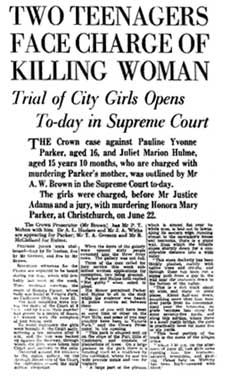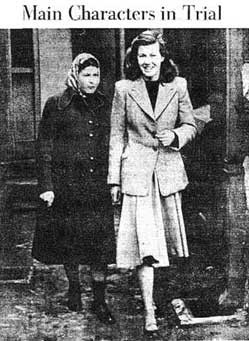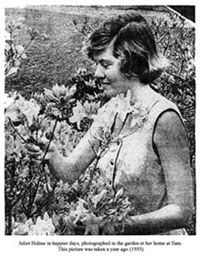Parker - Hulme Murder Case
Source: Star-Sun, 23 August 1954, p.1
Two teenagers face charge of killing woman
Trial of city girls opens today in Supreme Court.
 The
Crown Case against Pauline Yvonne Parker, aged 16, and Juliet Marion
Hulme, aged 15 years 10 months, who are charged with murdering Parker’s
mother, was outlined by Mr A W Brown in the Supreme Court today.
The girls were charged, before Mr Justice Adams and a jury, with
murdering Honora Mary Parker, at Christchurch, on June 22.
The
Crown Case against Pauline Yvonne Parker, aged 16, and Juliet Marion
Hulme, aged 15 years 10 months, who are charged with murdering Parker’s
mother, was outlined by Mr A W Brown in the Supreme Court today.
The girls were charged, before Mr Justice Adams and a jury, with
murdering Honora Mary Parker, at Christchurch, on June 22.
The Crown Prosecutor (Mr Brown) has Mr P.T. Mahon with him. Dr A.L. Haslam and Mr J.A. Wicks are appearing for Parker, Mr T.A.Gresson and Mr B.McClelland for Hulme. Fourteen jurors were challenged – four by Dr Haslam, five by Mr Gresson and five by Mr Brown. Seventeen witnesses for the Crown are expected to be heard during the trial which will probably last most of the week.Their evidence concerns the death of Honora Parker, whose body was found at Victoria Park, on Cashmere Hills, on June 22.
The first onlookers were trying the doors of the Court at 8 a.m., and by 9 a.m. their number had grown to a couple of dozen, all women with the exception of two young men. To avoid sightseers the girls were brought to Court early, arriving a few minutes after 9 a.m., and the van was backed up against the doorway, through which the girls were taken into Court and upstairs to the cells.
Gathered around the entrance to the public gallery, on the Armagh Street side of the Court, the sightseers missed the girls’ arrival altogether. When the doors of the gallery opened sixty people streamed into the three front rows. The gallery was not full. Three of the men called for jury service this week submitted written applications for exemption, two being granted.
 Parker
and Hulme both replied "Not guilty" when asked to plead.
His Honor permitted Parker and Hulme to sit in the dock while the
evidence was being heard. A police matron sat between them.
Parker
and Hulme both replied "Not guilty" when asked to plead.
His Honor permitted Parker and Hulme to sit in the dock while the
evidence was being heard. A police matron sat between them.
"Most of you will have been at some time or other on the Port Hills, and some of you may have possibly been in Victoria Park," said the Crown Prosecutor, in his opening.
"This park is situated well up on the slope of the Port Hills at Cashmere and consists of plantations of trees. On a large plateau in the park there is a building used as a residence by the caretaker and his wife, where he and his wife provide meals and teas for visitors. A large part of the plateau, which is almost flat over its whole area, is laid out in lawns. Along its eastern edge, running almost to the caretaker’s house and tearooms there is a stone wall from which the hillside slopes sharply down for a considerable distance into a wide valley.
This steep declivity has been thickly planted, mainly with trees and shrubs, and through these has been cut a zigzag path from a gap in the wall near the tearooms down to the bottom of the valley. This is a dirt track about 4ft wide, and steep in some places. About half-way down, something more than four hundred yards from its commencement near the tearooms, its grade becomes less steep for some seventy-five yards, and there is a small rustic bridge, the path is practically level for some five or six yards.
This level portion of the track is the scene of the alleged crime. About 3.30 p.m. on the afternoon of June 22, two girls came running into the tearooms, agitated, breathless, and gasping, "Please help us. Mummy has been hurt – covered with blood."
Discovery of body described
A few minutes later, the body of Mrs Parker was found, her head terribly battered. The situation of her body and the gross injuries to her head were so unusual that the police were called, and it was quickly apparent that she had been killed by being brutally battered about the head with a brick. Mrs Parker had been known for years as Mrs Rieper, but for convenience I shall call her Mrs Parker.
That evening, Pauline Parker was arrested, and the next day her close friend Juliet Hulme was arrested. The evidence will make it terribly clear that these two young accused conspired together to kill the mother of one of them, and horribly carried their plan into effect.
Most of you will have read in the newpapers, and no doubt discussed among your friends, the story of this crime. A good deal of the evidence has already been given in throughout New Zealand, I am given to understand, even overseas. The circumstances of this crime are unusual, and, indeed, unique. To say the least, it is extremely rare that two girls of the age that these two are should stand charged with murdering the mother of one of them. Because of the unusual circumstances, the case has been given a considerable amount of publicity, and it would be foolish to suppose that you know nothing of the evidence, and therefore you may have formed opinions upon it.
One of my duties is to ask you to endeavor to forget all you have read or heard about this case, and it is your duty to do so. You are here to decide the case on the evidence, and on the evidence alone, that you will hear in Court. The dead woman was the mother of the girl Parker, and was brutally done to death; and as far as one can see she has done nothing to deserve her awful fate.
On the other hand, the two girls now occupying the centre of stage are in a very difficult and distressing position, and the result of this trial may have dire consequences for them. I ask you to try to forget about these matters altogether. You may pity the dead woman and be incensed against these young persons in the dock, or you may feel pity for the the accused in the dreadful situation they find themselves in today. These things have nothing to do with this trial at all. Sentiment and emotionalism have no part in British justice.
Your duty is to deal with the case on the facts and not allow your judgement to be swayed by feeling either for the dead woman or the two accused. All you are concerned about is to decide whether or not they killed the unfortunate Mrs Parker, and whether or not they intended to do so.
The evidence will be that the two girls came to the conclusion, after much thought, that the mother of one of them, Parker, was an obstacle in their path, that she thwarted their desires, and that she should be done away with. They planned to murder her, and put their plan into effect by battering her over the head with a brick encased in a stocking.
Court told about families
 Before
hearing the evidence of the killing of Mrs Parker, it is important
that you should be told something about the accused and their families,
and what led up to their determination to remove the mother of Parker
from the path of their desires. These facts bring into clear perspective
the intention of the two to gain their ends by any means, and show
that they would not stop short of murder.
Before
hearing the evidence of the killing of Mrs Parker, it is important
that you should be told something about the accused and their families,
and what led up to their determination to remove the mother of Parker
from the path of their desires. These facts bring into clear perspective
the intention of the two to gain their ends by any means, and show
that they would not stop short of murder.
Mrs Parker was known as Mrs Rieper, having lived more than twenty years as the wife of Mr Herbert Rieper, who, unfortunately, was unable to marry her. No one had any inkling that Mr Rieper and the woman known as his wife were not married, least of all the accused Parker, their daughter. The relationship of the father and mother of the accused Parker was nothing whatsoever to do with the crime with which the accused are charged. Please put this aspect of the case completely out of your minds, and I emphasize this because there is no evidence at all that Mr Rieper and his dead "wife," apart from the fact that they were not legally married, were other than thoroughly good and decent people, good parents, and devoted to their children.
Their daughter is just over 16 years of age and about two years ago went as a pupil to Girls’ High School. There she met the girl Hulme, who is just over 15 years old, and joined the Girls’ High School about the same time as Parker did. The two girls at once became friendly, and their friendship developed rapidly into what may be called an intense devotion for each other. So much so that their main object in life was to be together to share each other’s thoughts and activities, secrets and plans, and if anyone dared come between them that person should be forcibly removed.
From about August of last year Dr Hulme and his wife, with their daughter, lived at Ilam, the residence of the Rector of Canterbury University College, some distance from the Rieper’s home. The girl Parker visited there regularly and on occasions stayed for days at a time. At Dr Hulme’s place they wandered about together, keeping very much to themselves, scribbled in exercise books effusions which they called novels, spent a good deal of time in each other’s beds, and made plans for their future life together.
Mrs Parker became perturbed over their unhealthy relationship and tried to break it up. This interference was resented by the girls, their resentment gradually growing to hatred and eventually resulting in this ghastly crime. Early this year, Dr Hulme, who was Rector of Canterbury College, decided to resign and return home to England. Circumstances in his home were not too happy.
The two girls, it was discovered, were planning to go to the United States "to have their novels published" and had been trying by various means to acquire the money for their fares. The plan apparently was put out of their heads, and it was arranged that the girl Hulme should go with her father as far as South Africa. The girl Parker wanted to go with her, and the girl Hulme wanted Parker to accompany them. Both girls were determined not to be parted and both knew that Mrs Parker would object to their going away together. They decided that the best way to end Mrs Parker’s objections was to kill her in such a manner as to make her death appear to be an accident.


 Discover your family’s history at our libraries
Discover your family’s history at our libraries